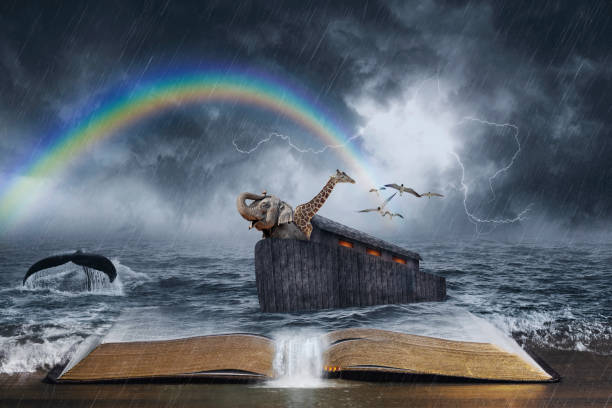- Noah means comfortable. In 5:29 his father names him so with the hope the new child will bring comfort, yet in 6:6 and in 6:7 the verb נחם, which means to comfort, is used in its other meaning – to regret. Is there a connection here? Could it be that Noah was too comfortable with himself and did not bring the desired change for the people?
- In Ezekiel 14:14 Noah is mentioned with Daniel and Job as an example for righteous people who could only save themselves at times of disaster. What is the connection between the three men?
- The sin for which the world is destroyed is חמס, which usually means state-sponsored injustice. This word also appears in connotation with Avraham (16:5). Is there a connection?
- Should the story of the ark be taken literally? How many species and provisions could one fit in the ark? Chinese medieval fleets included ships with gardens and desalinization devices to guarantee fresh produce, while European sailors were plagued with scurvy. Where did the occupants of the ark get their fresh produce from?
- If God loves Noah, why not save him in a more comfortable way? Why not let him stay on top of one of the mountains and live in the open? Can you imagine being stuck in a car for a whole year with your family and traveling zoo without being able to stop? Noah’s miraculous saving is a torturous one.
- How many animals of each species entered the ark? There are contradicting reports in 6:19-20, 7:2-3, 8:9, and 8:16.
- Children love to imagine the ark with the colorful zoo on it, but what about the rest of the world? The magnitude of the devastation is incomprehensible. Is it possible that Noah got drunk to get over his depression and guilt for not standing up for humanity?
- Noah is being told that humanity is now allowed to eat meat. Does it mean that ideally humans should be vegetarians? Is the Impossible Burger the beginning of the road to Gan Eden?
- The first murderer was pardoned by God, and now God tells humanity to establish courts and punish murderers (9:5-6). Could God be saying that forgiving Cain was a mistake? How can we understand these verses in context of the debate over death penalty today? For example, the State of Israel vowed not to practice capital punishment, Eichmann being the only exception. Is this the right decision?
- In 9:6 we read that he who shed the blood of man, his blood will be shed by men, for man was created in the Image of God. Wouldn’t the image of God be an argument against capital punishment?
- After bringing sacrifices and communicating with God, Noah’s first act is to plant a vineyard and get drunk. How long does it take to produce wine from a newly planted vineyard? It seems that Noah was bent on getting drunk. Why?
- Noah is very upset with his son Ham who saw him naked and mocked him. Why is he so upset? Why does he curse the youngest son of Ham and not Ham himself? Is it possible that Noah is angry with himself for not being able to impart values of civility, even to his own son, and takes it on his youngest descendant?
- In chapter 11, verses 1-9, we read about the Tower of Babel. The builders did not commit any sin, and God’s reaction is not really a punishment. It is possible to see the story as a cautionary tale. The builders wanted to create a totalitarian society. They had good intention but God foresaw the possible dangers, and he therefore thwarted their efforts by introducing the diversity of language.
- In 11:29 we read that Nahor, Avram’s brother, married Milka, the daughter of Haran, who was the father of Milka and Yiska. The Midrash identifies this Haran with the third brother of Avram and Nahor, and since is sees no need in mentioning Yiska, identifies Yiska with Milka. If it seems confusing, it is, and I have seen many students struggling with that family tree. The simple meaning of the verse is that this Haran, the father of Milka, was NOT related to Nahor. The verse emphasizes that he was the father of Milka and Yiska to tell us that this is a different Haran.
- In 11:31 it is written that Terah took his family and left Ur of the Chaldeans to go to Canaan, but later in Bereshit (14:7), God tells Avraham that He took him out of Ur. Does that mean that God prompted Terah to leave?
Enjoy reading and learning,
Shabbat shalom
R. Haim Ovadia


















